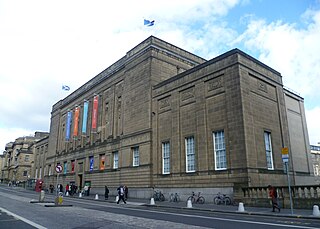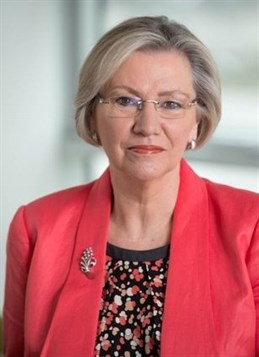Related Research Articles

Melvyn Bragg, Baron Bragg is an English broadcaster, author and parliamentarian. He is the editor and presenter of The South Bank Show, and the presenter of the BBC Radio 4 documentary series In Our Time.

John Birt, Baron Birt is a British television executive and businessman. He is a former Director-General (1992–2000) of the BBC.
Sir Michael Checkland is a retired British television executive, who was Director-General of the BBC from 1987 to 1992, being appointed after the forced resignation of Alasdair Milne.

Edinburgh Napier University is a public university in Edinburgh, Scotland. Napier Technical College, the predecessor of the university, was founded in 1964, taking its name from 16th-century Scottish mathematician and philosopher John Napier. The technical college was inaugurated as a university in 1992 by Lord Douglas-Hamilton, becoming Napier University. In 2009, the university was renamed Edinburgh Napier University.

The National Library of Scotland is one of the country's National Collections. It is one of the largest libraries in the United Kingdom. As well as a public programme of exhibitions, events, workshops, and tours, the National Library of Scotland has reading rooms where visitors can access the collections. It is the legal deposit library of Scotland and is a member of Research Libraries UK (RLUK) and the Consortium of European Research Libraries (CERL).

Robert Haldane Smith, Baron Smith of Kelvin, is a British businessman and former Governor of the British Broadcasting Corporation. Smith was knighted in 1999, appointed to the House of Lords as an independent crossbench peer in 2008, and appointed Knight of the Thistle in the 2014 New Year Honours. He was also appointed to the Order of the Companions of Honour in 2016.
John William Beerling is a British radio producer and station controller.

Queen Margaret University Edinburgh is a university founded in 1875 and is located wholly within the county of East Lothian on the outskirts of Musselburgh. It is named after the Scottish Queen Saint Margaret (1045–1093).

Jacqueline Margaret Kay, is a Scottish poet, playwright, and novelist, known for her works Other Lovers (1993), Trumpet (1998) and Red Dust Road (2011). Kay has won many awards, including the Somerset Maugham Award in 1994, the Guardian Fiction Prize in 1998 and the Scottish Mortgage Investment Trust Book of the Year Award in 2011.
Merchiston is a residential area around Merchiston Avenue in the south-west of Edinburgh, Scotland.

Sir John Tusa is a British arts administrator, and radio and television journalist. He is co-chairman of the European Union Youth Orchestra from 2014. chairman, British Architecture Trust Board, RIBA, from 2014. From 1980 to 1986, he was a main presenter of BBC 2's Newsnight programme. From 1986 to 1993, he was managing director of the BBC World Service. From 1995 to 2007, he was managing director of the City of London's Barbican Arts Centre.

The National Theatre of Scotland, established in 2006, is the national theatre company of Scotland. The company has no theatre building of its own; instead it tours work to theatres, village halls, schools and site-specific locations, both at home and internationally.
Sir John Richard Gray Drummond was a British arts administrator who spent most of his career at the BBC. He was described by Rodney Milnes of Opera magazine as "one of the most formidable figures in the arts world of the UK for 40 years".
Sir David Alexander Ogilvy Edward is a Scottish lawyer and academic, and former Judge of the Court of Justice of the European Communities. Sir David is an Honorary Fellow of University College, Oxford; Honorary Professor of the University of Edinburgh and Fellow of the Royal Society of Edinburgh. He is also an Honorary Sheriff of the Sheriffdom of Tayside, Central and Fife at Perth, Scotland.
Dame Elizabeth Anne Lucy Forgan, DBE is an English journalist, and radio and television executive.
Alan Davey, CBE is a British arts administrator, public servant, and civil servant.
Geraint Talfan Davies OBE DL FRIBA FLSW is a Welsh journalist and broadcaster, and a long-serving trustee and chairman of many Welsh civic, arts, media and cultural organisations.

Professor Dame Joan Kathleen Stringer, DBE, FRSE, FRSA is a British political scientist and former Principal and Vice-Chancellor of Edinburgh Napier University and Queen Margaret University, Edinburgh.

Dame Lesley Anne Glover is a Scottish biologist and academic. She was Professor of molecular biology and cell biology at the University of Aberdeen before being named Vice Principal for External Affairs and Dean for Europe. She served as Chief Scientific Adviser to the President of the European Commission from 2012 to 2014. In 2018 she joined the Principal's senior advisory team at the University of Strathclyde.

Samir Shah, CBE, is a British television and radio executive. He has worked for London Weekend Television, the BBC, and is the chief executive of Juniper TV a British company. In 2021, he co-authored the UK government's Commission on Race and Ethnic Disparities report.
References
- 1 2 3 "Chair Appointed to National Library of Scotland". www.scotland.gov.uk. Archived from the original on 30 October 2012.
- 1 2 3 4 5 "James Boyle - Chair, British Council Scotland Committee | British Council". Archived from the original on 4 September 2012. Retrieved 12 July 2012.
- 1 2 "Cultural Commission - James Boyle". Archived from the original on 19 January 2007. Retrieved 5 September 2006.
- ↑ "The Royal Society of Edinburgh | 2016 Elected Fellows". Archived from the original on 8 October 2016. Retrieved 8 March 2016.
- ↑ "BBC - Scotland - the Wireless to the Web - History".
- ↑ New image for BBC Radio 4, BBC News, 7 April 1998. Accessed 9 October 2008.
- ↑ http://findarticles.com/p/articles/mi_qn4158/is_19970714/ai_n14124643 [ dead link ]
- ↑ "BBC News | Entertainment | Ratings relief for BBC Radio 4".
- ↑ "Boyle steps down at Radio 4". BBC News . 16 January 2000. Retrieved 9 October 2008.
- ↑ Taylor, Alan. no way to make waves, The Sunday Herald, 11 May 2003. Accessed 9 October 2008.
- ↑ "Scottish Arts Council - Scottish Arts Council director has left". Archived from the original on 27 September 2007. Retrieved 2 June 2007.
- ↑ "Cultural Commission - Home". Archived from the original on 22 January 2007. Retrieved 5 September 2006.
- ↑ New tsar to head culture review, BBC News, 22 April 2004. Accessed 9 October 2008.
- ↑ Nicoll, Ruaridh. Boyle gets it right, The Observer, 3 July 2005. Accessed 9 October 2008.
- ↑ "Vision paints pretty arts picture". 23 June 2005.
- ↑ "The Sunday Herald - Scotland's award-winning independent newspaper". Archived from the original on 7 January 2009. Retrieved 5 September 2006.
- ↑ "Fury as culture report looks set to be 'buried' No word from | Sunday Herald, the | Find Articles at BNET.com". Archived from the original on 4 February 2008. Retrieved 5 September 2006.
- ↑ "Mapping out Scotland's cultural future". Archived from the original on 11 October 2008. Retrieved 5 September 2006.
- ↑ "New Chair for National Library - National Library of Scotland". www.nls.uk. Archived from the original on 1 February 2013.
- 1 2 http://www.scotsman.com/the-scotsman/books/former-bbc-controller-james-boyle-to-lead-national-library-of-scotland-reorganisation-1-2598552 [ dead link ]
- ↑ "Home". National Library of Scotland. Retrieved 16 May 2022.
- ↑ "Legal Deposit Libraries Act 2003". Archived from the original on 3 February 2010.
- ↑ "Home". cityofliterature.com.
- ↑ "Archived copy" (PDF). www.glasgowcityofmusic.com. Archived from the original (PDF) on 2 August 2016. Retrieved 12 January 2022.
{{cite web}}: CS1 maint: archived copy as title (link) - ↑ "British Council". Archived from the original on 20 October 2011. Retrieved 21 October 2011.